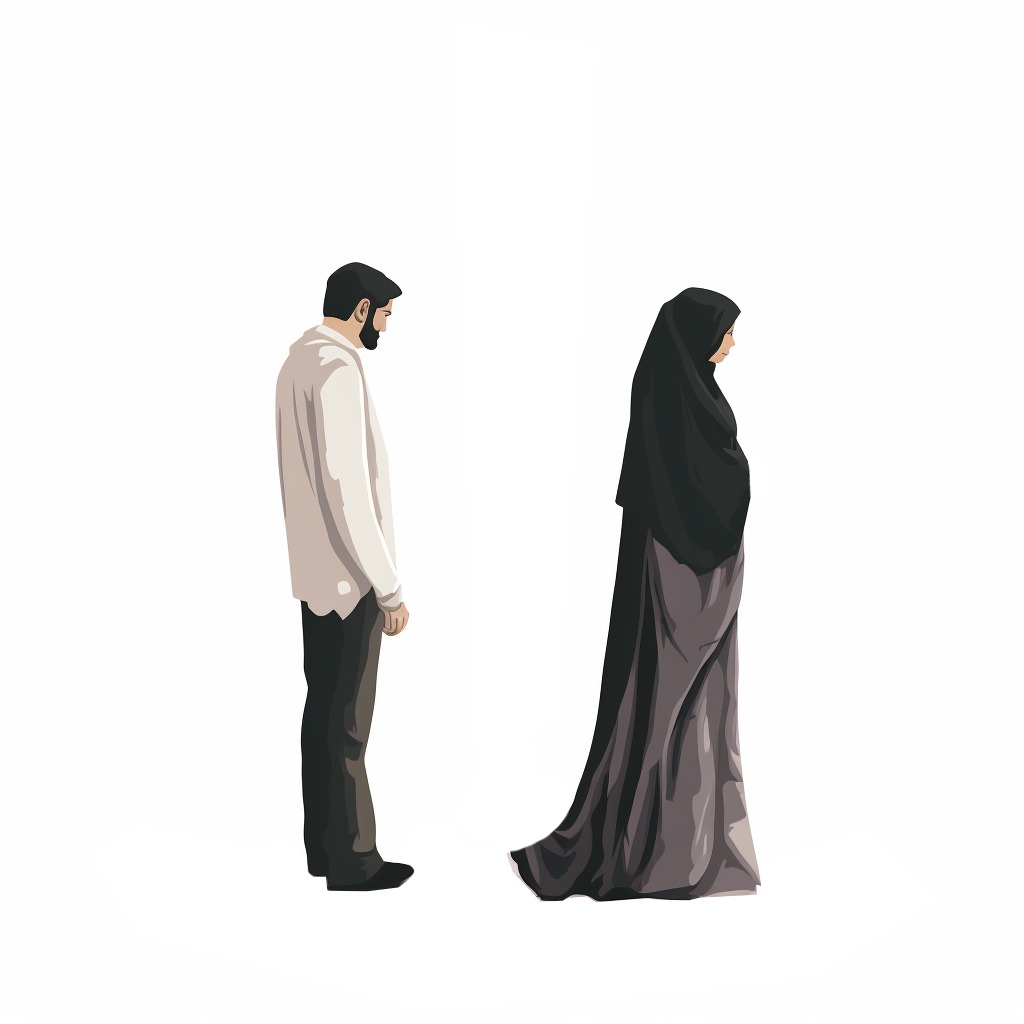
This article will discuss the female-initiated divorce right of khulʿ in Ḥanafī jurisprudence. In particular, it will seek to address a misunderstanding amongst many scholars that Ḥanafī jurisprudence only allows a khulʿ if a wife either returns her mahr (dower) to her husband or provides some form of compensation to him, in return for the divorce, irrespective of who is at fault in the marital breakdown. This article will seek to show the return of the mahr is not always considered a binding and conditional element of the khulʿ. Rather, the Ḥanafī jurists have taken a much more nuanced approach in respect of this matter and with regard to what, if anything at all, needs to be returned by the wife.
The subordinate status of women in Muslim countries has become the focal point of much academic writing in recent years1. The revival of Islamic norms throughout the Muslim world is often wrongly equated with increased oppression towards women, symbolised by the wearing of the veil and segregation of the sexes2. Combined with pre-existing patriarchal cultural and societal structures, the violation of women’s rights has become the focus of governments, NGOs and women’s rights activists in recent years3. The personal status laws of a particular state can also be symptomatic of women’s low position in society4, particularly laws relating to divorce and polygamy5. The subordination of women within the domestic sphere can create a platform for their subjugation in other spheres of life: thus, advocating reform within these parameters has wider consequences for women in the economic, social and political arena6.
Within this context, the importance of female marital emancipation is acutely evident. An intellectual engagement with a secure right to divorce is extremely significant for women, as it can contribute to their overall empowerment. Challenging existing hierarchies within families can become a springboard to secure greater rights within the public sphere7. A right to secure an exit from marriage is not merely an academic question, however, but an extremely pressing necessity for many Muslim women around the globe. The freedom to divorce can amount to freedom from violence, abuse and humiliation; an escape from authoritarian rule that can be life-threatening.

Within Islamic law, men have a unilateral right to divorce their wives, through the utterance of the word talāq (I divorce you), whilst a woman must seek redress through the courts if she wishes to initiate a divorce without the consent of her husband8. One such right is the khulʿ where a wife may ask her husband for a divorce9. Although all four schools of Sunni Islamic law recognise khulʿ as a female-initiated divorce right, this article will focus only on Ḥanafī jurisprudence as this has been used as the basis for limiting female divorce rights in the Indo-Pak subcontinent10. A common misconception exists in past and present scholarship that Ḥanafī jurisprudence only allows a khulʿ if a wife necessarily returns her mahr (dower) or provides some form of compensation to her husband in return for the divorce, irrespective of who is at fault in the marital breakdown11.
Thus, the khulʿ has often been criticised as a process where a wife must ransom herself in order to gain release from the marital bond12. In societies where a woman has a weaker socioeconomic position than that of her male counterparts, this can create an onerous financial liability upon her. If the wife is unable to provide any financial recompense, this can leave her at the mercy of a cruel and malicious husband, who may or may not release her through a ṭalāq, or may make her life so unbearable within the marriage that she is forced to seek a khulʿ at her own legal expense.
However, a closer look at the primary sources of Ḥanafī jurisprudence reveals that the return of the mahr is not always considered a binding and conditional element of the khulʿ. Instead, the Ḥanafī jurists have taken a much more refined approach regarding the return of any compensation. The central Qurʾānic verse that deals with the matter of the khulʿ is verse 2:229 where recompense in matters of divorce is mentioned twice in this verse.
“Divorce is (revocable) two times (only). Then either retain (the wife) with honour (in marital relationship) or release her with kindness. And it is not lawful for you to take back anything of that which you have given them, unless both fear that (now by maintaining marital ties) they may not be able to observe the limits set by Allah. So if you fear that both will be unable to keep within Allah’s limits, then (in that case) there shall be no sin upon either of them if the wife (herself) may give up something as recompense to free herself (from this distressing bond). These are the limits (set) by Allah. So, do not exceed them. And those who exceed the limits prescribed by Allah, it is they who are the wrongdoers”.13
In the beginning of this Qurʾānic verse, the addressee is the husband, and it has been made unlawful for him to take anything back from his wife that he had previously given to her. The exegetes have termed the ‘taking back’ of something in the beginning of the verse as referring to the return of the mahr14. If, however, the spouses cannot maintain the marital ties, then the procedure for a wife to exit the marriage is given in the next part of the verse. This states that there is no sin if a wife may give some recompense to free herself from the marital bond, but the passage does not specify what that exact amount should be. The Qurʾān does not specify the nature of the recompense, nor does it place any minimum or maximum limit upon it. More importantly, the Qurʾānic verse does not state that the giving of some recompense by the wife is compulsory, but that there is no sin on her if she decides to give it and the husband accepts it.

In this verse, the Arabic word junāḥ-un is used to designate that the return of some recompense is permissible, but is not a mandatory order. Shaykh-ul-Islam Dr Muhammad Tahir-ul-Qadri asserts that junāḥ-un (“there is no sin”) is used twenty-four times within the Qurʾān in various places, and each time it is used in the context of allowing an act, but never does it constitute a direct ḥukmor commandment15. He argues, for example, that verse 2:198, states:
“And it is no sin on you if you (also) seek your Lord’s bounty (through trade during the Hajj days)”.16
The word junāḥ-un is used to indicate that pilgrims may, if they wish, engage in trade during the hajj. This certainly does not mean that they must engage in such trade, merely that they are free to do so if they wish17. Similarly, in verse 2:30, the Qurʾān states:
“…But if he (the latter) also divorces her, in such a case there shall be no sin on both of them (the former husband and the wife) if they return (once more to the wedlock)”.
Again, it is obvious from the context of the verse above that a divorced couple may remarry, but not that they must marry. Through the exegetical analogy of the Qurʾān with these and other verses highlighted, it cannot be said that there is a Qurʾānic injunction that states that a khulʿ can only be affected through the return of the mahr, as many believe. Instead, the Qurʾān is explicit in stating junāḥ-un: that there is no sin upon the wife, who may provide some recompense to release herself from the marital bond, but not that she must do so, or that any such recompense must constitute part of her mahr. This is in contrast to the prohibition upon the husband in asking for the return of the mahr in the earlier part of the verse. Here the words used are ḥill-un, meaning unlawful, and this is a direct commandment towards the husband rather than a discretionary act, as in the case of the wife.

Al-Ṭabarī endorses this view in his commentary on the Qurʾān and states that verse 2:229 does not mean that a wife must necessarily return the mahr if she requests a khulʿ.18 He states this is only required if it is proved that the nushūz (disobedience) is on the part of the wife, and quotes various ṣaḥāba19 and tābiʿīn20 to support his opinion21. ʿAbd Allāh b. ʿAbbās mentions verse 2:229, and in his opinion, if the wife has misbehaved in the marriage, only then is it permissible for the husband to request some form of recompense to release her from the marriage22.
According to ʿUrwa b. al-Zubayr, it is not lawful for a husband to receive any compensation unless it is proven that the fasād (conflict) appears to have come from the wife’s side. ʿUrwa b. al-Zubayr gives the example of a wife who claims that she cannot fulfil her husband’s sexual rights. In this instance, it is permissible for the husband to receive something in lieu of the marital breakdown23. Similarly, Jabr b. Zayd is of the opinion that if there is any sharh (mischief) on the part of the wife, then it is permissible for the husband to ask for the mahr, but he too emphasises that this is not a conditional element of the khulʿ24. In his explanation of verse 2:229, al-Rabīʿ states that if a wife behaves nicely towards her husband, he cannot force her to give him any compensation. Here it is clearly implied that a husband cannot force a wife to apply for a khulʿ in order to receive some recompense for the marital breakdown. Al-Rabīʿ goes on to state that if the husband has received anything from his wife (through such forceful separation), then whatever he has received from her is not lawful. Only if is proven that the nushūz or ẓulm is from the wife’s side is it permissible for the husband to get the recompense25. Al-Zuhrī is also of the opinion that a husband cannot force his wife to demand a khulʿ through coercion. He states that such an action is not jāʿiz (permissible), and nor is the acceptance of any compensation in such an instance. A wife is only liable to compensate her husband in any manner if it is proven that she has acted in an inappropriate manner26.

Al-Qurṭubī also states that even though the Qurʾānic verses 4:19-2027 were revealed to relate to a husband’s right to a ṭalāq, through exegetical analogy of the Qurʾānic verses, they also provide the basic principles to be followed when dealing with the matter of compensation in respect of the khulʿ and verse 2:22928. Verses 4:19-20 admonish husbands who wish to remarry but forcibly retain their wives in the hope that the wives may seek separation themselves and thus relinquish their mahr. Al-Qurṭubī argues that these verses clearly state that a husband cannot cause harm to his wife in the hope that he will gain back from his wife what he had already given (namely the mahr). Thus, in the case of a khulʿ, if the nushūz or harm is from the husband, he has no right to ask for the return of the mahr29.
It is clear from the discussion above that the Qurʾān does not equate the return of some recompense as a prerequisite of the grant of the khulʿ; rather, any such compensation is something that is permissible, but not mandatory. Whilst the Qurʾān provides very few details regarding khulʿ and the mechanisms to be employed, precedents from the Sunna (practices of the Prophet ﷺ) are used to elaborate the matter further. The primary ahadith (sayings of the Prophet) on this subject describe the wife of Thābit b. Qays approaching the Prophet (ﷺ) and requesting a release from her marriage30. In Bukhārī’s version of the hadith, the Prophet (ﷺ) asks Thābit’s wife to return the garden given to her by her husband, but does not specify whether this was the mahr. Although al-Shaybānī states that the garden in this instance was the mahr that Thābit had given to his wife31, senior Ḥanafī jurists all adopt the view proffered by al-Ṭabarī and al-Qurṭubī above32. Moreover, the words of the hadith are also not specific regarding exactly what the recompense should be and certainly do not mention that it must necessarily constitute a return of the mahr, as is commonly believed.

In the same vein, both al-Jaṣṣāṣ and al-Marghīnānī adopt the same procedure as al-Qurṭubī and use verse 4:20 of the Qurʾān to establish the basic principles governing the return of any compensation in the event of a divorce: namely that if the nushūz is from the husband, then his acceptance of compensation is makrūh (disapproved of)33. Al-Jaṣṣāṣ states that it is morally wrong for a husband to force his wife to speak out, particularly when the husband has no intention of keeping his wife but plans to make her life so intolerable that she must opt for a divorce34. In such an event, it is not permissible for the husband to receive any compensation for the wife35. Al-Jaṣṣāṣ also considers it unlawful for a wife to wilfully give up a mahr if the nushūz is from the husband. He argues that even though a wife may give up her claim to her dower during the marriage, this will not be the case in respect to a khulʿ, as she will be wilfully causing herself harm, which is not only morally unacceptable but also goes against the other verses of the Qurʾān and the text of the hadith36.
Al-ʿAynī also alludes to verse 4:20, and categorically states that if the nushūz is from the husband, it is makrūh for him to receive any compensation from his wife, be it qalīl (a very small amount) or kathīr (a very large amount37). Al-ʿAynī reasons that a wife is suffering double harm, analogous to what takes place in verses 4:19-20: the emotional torture of her husband’s remarriage and then being penalised by having to provide recompense to her husband to release herself from such a marriage. The behaviour is described as waḥshat – coercive – on the part of the husband. Thus, if a husband has received any compensation under these circumstances, then he is under a mandatory liability to return such recompense to his ex-wife38. Ibn ʿĀbidīn goes further, and is of the opinion that those scholars who label the act of receiving unlawful compensation as al-makrūh or al-makrūh al-taḥrīmī is in fact such a strong a prohibition, “there should be no doubt about that fact”39.
Al-Sarakhsī states that if a husband is found to be at fault, then he forfeits his right to request the return of the mahr, terming it al-makrūh al-taḥrīmī40. He too bases his view on verse 4:20. Interestingly, al-Sarakhsī posits the example of a husband who demands 1000 dirhams in return for declaring three ṭalāqs to a wife. If, on such an occasion, a wife agrees to such a demand but her husband fails to pronounce the three ṭalāqs and only gives one ṭalāq, the wife will only be liable to pay 300 dirhams as compensation41. However, if the wife demands three ṭalāqs with an offer of 1000 dirhams, a husband who only pronounces one ṭalāq will not be able to recoup any amount of compensation due to his failure to comply with the agreement42. Here, preferential treatment is given to the wife in respect to the enforcement of the agreement between the spouses. Al-Sarakhsī goes on to say that if the amount in question is disputed, then the opinion of Abū Ḥanīfa is that the burden of proof lies with the husband to prove his claim. Since it is the wife who is required to pay, in the absence of any other witnesses the wife’s view will be accepted over that of the husband43.

Both al-Kāsānī and al-Qudūrī also regard any nushūz on the part of the husband as a coercive tactic to force a khulʿ from the wife and thus label it not permissible44. Ibn al-Hammām goes even further than his Ḥanafī counterparts and states that if the nushūz is not on the part of the wife, then not only is it ḥarām for a husband to receive any compensation from his wife, she cannot even voluntarily give up the mahr through mutual consent, as this would cause her ḍarar (harm), which he finds unacceptable45. These views of the Ḥanafī jurists are extremely important, as they acknowledge the fact that a wife should not be financially penalised if her husband is to blame for the marital breakdown.
Whilst it has been shown that there is no liability upon the wife to return any compensation to her husband if he is responsible for the nushūz, if the wife is responsible for the nushūz, the fuqahāʾ are unanimous that she must provide some form of compensation to her husband upon her request of the khulʿ. This can be mutually agreed between the two spouses, or, in case of dispute, the matter can be referred to a qāḍī or the court. There is, however, some disagreement amongst the jurists as to whether a husband can demand more than the mahr as compensation for the khulʿ. In his discussion of the khulʿ, the version proffered by al-Shaybānī relates to the situation where Thābit’s wife is willing to return more than the garden but is refused by the Prophet (ﷺ). Al-Shaybānī notes that the Prophet (ﷺ) disliked the return of more than the mahr as compensation for the khulʿ and did not find this morally acceptable46.
Al-Shaybānī, however, argues that this reading is only acceptable if it is proven that a wife has been nushūz: disobedient to her husband. In this instance, ṭāba al-faḍl liʾl-zawj: “the husband may enjoy the excess”47. The rationale behind this viewpoint is that the nikāḥ is viewed as a contractual agreement between the husband and wife. When entering the agreement, just as a wife can request any amount of mahr from her husband as compensation for entering into the marital contract, even if it is more than mahr al-mithl48, so, when she is breaking the marital covenant as a result of her own wrongdoing, she can offer more compensation to her husband in return for this breach. This is considered her own free choice in agreeing to give more than the mahr. In the case of a dispute, she is entitled to refer the case to the court. Al-Shaybānī also qualifies his statement by stating that if it is found that the husband is nushūz and initiates the argument, then he is not entitled to demand more than the mahr49.

However, in his commentary on the Hidāya, Al-ʿAynī states that al-Marghīnānī rejected al-Shaybānī’s opinion, stating that this is not “part of our (Ḥanafī) view”50. Even if it is proven that a wife is nushūz, taking more than the original mahr as compensation is disapproved of, and he quotes the Prophet’s refusal of Thābit’s wife’s offer to provide more than the garden. Al-Jaṣṣāṣ offers his view from the opinions of Abū Ḥanīfa, Zufar and Abū Yūsuf, who clearly state that if the dispute comes from the wife’s side, then it is only permissible for a husband to request what he had given to her (as the mahr) and nothing more51. Al-Jaṣṣāṣ, al-Kāsānī, al-Qudūrī and Ibn al-Hammām also regard the return of more than the mahr, in any circumstance, to be morally reprehensible, and legally term it al-makrūh (abhorrent)52. Although al-Kāsānī accepts that a wife can voluntarily offer more if she so wishes, he believes that this has the potential to cause the wife harm, and is thus an objectionable act53. Ibn al-Hammām quotes a student of ʿAbd Allāh b. ʿAbbās, ʿAṭāʾ, who reports that the Prophet (ﷺ) himself states that a husband cannot receive more than the sum that he originally gave to his wife54.
In conclusion, this article has sought to show that providing financial compensation is not a compulsory element of the khulʿ, but is dependent upon who is at fault within the marital breakdown. If the wife is proven to be at fault, then the husband has the right to receive some recompense from his wife, but this must not be more than any mahr that he has given to her upon the contract of the marriage. However, if the fault lies with the husband or if he has coerced his wife to seek a khulʿ through misbehaviour, then the wife is not liable to repay any compensation to her husband in return for the divorce. In the case of disputes regarding any of these issues, both the husband and the wife have the right to go to a court and have the matter resolved according to the principles highlighted above.
1 See Chitra Raghavan et al. Self-Determination and Women’s Rights In Muslim Societies, (Brandeis Series on Gender, Culture, Religion and Law, 2012); Lila Abu-Lughod, Do Muslim Women Need Saving? (Harvard University Press, 2013); Vrinda Narain, Gender and Community; Muslim Women’s Rights in India (University of Toronto Press, 2001); Haideh Moghissi ed, Women and Islam: Critical Concepts in Sociology, (Routledge, 2005).
2 John Esposito with Natana DeLong-Bas, Women in Muslim Family Law (Syracuse: Syracuse University Press, 2001), 105.
3 See Naz K. Modirazdeh, “Taking Islamic Law Seriously: NGOs and the Battle for Muslim Hearts and Minds,” Harvard Human Rights Journal 19 (2006): 191-192.
4 Essam Fawzy, “Muslim Personal Status Law in Egypt: The Current Situation and Possibilities of Reform Through Internal Initiatives”, in Women’s Rights and Islamic Family Law: Perspectives on Reform, ed. Lynn Welchmann (London: Zed Books, 2004), 27.
5 Esposito, Women in Muslim Family Law (Syracuse: Syracuse University Press, 2001), 134
6 See Bharathi Anandhi Venkatraman, “Islamic States and United Nations Convention on the Elimination of all Forms of Discrimination Against Women: Are the Shari’a and the Convention Compatible?” American University Law Review 44 (1995): 1949, 1950-51.
7 Karin Carmit Yefet, “Lifting the Egyptian Veil: A Constitutional Road Map to Female Marital Emancipation in the Islamic World,” The Family in Law 5, no. 87, (2011), 87.
8 Classical Ḥanafī jurisprudence specifically mentions only a limited number of grounds for a woman to seek a judicial divorce, assuming that she will seek a khulʿ in all other situations. See Esposito, Women in Muslim Family Law, 32-34
9 Hisham M. Ramadan, Understanding Islamic Law: From Classical to Contemporary (New York: Alta Mira Press, 2006), 120-121.
10 Lucy Carroll, “Qurʾān 2:229: ‘A Charter Granted to the Wife?’ Judicial khulʿ in Pakistan,” Islamic Law and Society 3, no. 1 (1996): 91-126
11 Ibid.,
12 Doreen Hinchcliffe, “Divorce in Pakistan: Judicial Reform”, Journal of Islamic and Comparative Law, 2 (1968a), 25; Taslima Monsoor, From Patriarchy to Gender Equity. Family Law and its Impact on Women in Bangladesh (Dhaka: University Press Ltd, 1999), 190.
13 Shaykh-ul-Islam, Dr.Muhammad Tahir-ul-Qadri. The Glorious Quran. Minhaj-ul-Quran Publications, 2011. 2:229
14 Al-Qurṭubī, al-Jāmiʿ li-Aḥkām al-Qurʾān, 582-583; Ibn Kathīr, Tafsīr al-Qurʾān al-Aẓīm, 1:273 (Beirut: Dār al-Fikr, 1980).
15 Muhammad Tahir-ul-Qadri, Islamic Principles of Family Law (unpublished manuscript with the author). Qadri (1979) provides 24 verses of the Qurʾān where the word junāḥ-un has been used as pertaining to permissibility only 2:198, 2:229, 2:230, 2:233, 2:233, 2:234, 2:235, 2:236, 2:240, 2:282, 4:23, 4:24, 4:101, 4:102, 4:128, 5:93,24:29, 24:58, 24:60, 24:61, 33:5, 33:51, 33:55, 33:60 33:10. Qadri states that there is only one ayah where junāḥ-un is used as mandatory, which relates to the qaṣr (shortened) prayer during travelling (4:101).
16 The Glorious Quran. 2:30.
17 Tahir–ul-Qadri, Islamic Principles of Family Law
18 Abū Jaʿfar Muhammad b. Jarīr al-Ṭabarī, Tafsīr al-Ṭabarī (Cairo: Dār Ibn al-Jawzī, 2008), 557.
19 The title given to the companions of the Prophet (ﷺ).
20 The title given to the companions of the companions of the Prophet (ﷺ).
21 See also Ibn al-Qaṭṭān al-Fāsī, al-Iqnāʿ fī Masāʾil al-Ijmāʿ, 93, who states that there is ijmāʿ on the fact that if the husband has committed ẓulm upon the wife, he has no right to request the return of any compensation.
22 Al-Ṭabarī, Tafsīr al-Ṭabarī, 557.
23 Al-Ṭabarī, Tafsīr al-Ṭabarī, 557.
24 Al-Ṭabarī, Tafsīr al-Ṭabarī, 558.
25 Al-Ṭabarī, Tafsīr al-Ṭabarī, 558.
26 Al-Ṭabarī, Tafsīr al-Ṭabarī, 559.
27 Al-Qurʾān, 4:19. “O believers! It is not lawful for you to become heirs to women by force. And do not retain them by force in order to take (back) from them a portion of what you gave them, unless they commit open indecency. And treat them honourably. Then if you dislike them, it may be that you dislike a thing and Allah places in it abundant good” Al-Qurʾān, 4:20. “And if you seek to take a wife in place of another and you have (by now) given to her heaps of wealth, yet do not take back any part of it. Do you want to take that wealth (back) by means of unjust accusation and manifest sin?”
28 Al-Qurṭubī, al-Jāmiʿ li-Aḥkām al-Qurʾān, 836.
29 Al-Qurṭubī, al-Jāmiʿ li-Aḥkām al-Qurʾān, 497.
30 Muhammad b. Ismāʿīl al-Bukhārī, al-Ṣaḥīḥ, trans. Muhammad Muhsin Khan, vol. 7 (Dār al-Salām; 1997) Hadith 5273, 5274, 5275 (132-133); Abū Dāwūd Sulaymān ibn al-Ash‘ath al-Azdi as-Sijistani al-Sunan, trans. Nasīr al-Dīn al-Khaṭṭāb, vol. 3. (Maktaba Dār al-Salām, 2008) Hadith 2227, al-Nasāʾī, al-Sunan, trans. Nasīr al-Dīn al-Khaṭṭāb, vol. 4 (Maktaba Dār al-Salām) Hadith 3491-3492.
31 Al-Shaybānī, Kitāb al-Aṣl, 549.
32 See al-Zaylaʿī, Tabyīn al-Ḥaqāʾiq, vol. 7 (Cairo: al-Maṭbaʿ al-Kubrā, 1912), ʿAlāʾ al-Dīn al-Ḥaskafī, Durr al-Mukhtar fī sharḥ Tanwīr al-Abṣār, in Ḥāshia Radd al-Muḥtār, Ibn ʿĀbidīn, vol. 3 (Beirut: Dār al-Fikr, 2005) 489.
33 Al-Marghīnānī, Al-Hidāya, 315; Al-Jaṣṣāṣ al-Ḥanafī, Aḥkām al-Qurʾān, 392.
34 Al-Jaṣṣāṣ al-Ḥanafī, Aḥkām al-Qurʾān, 392.
35 Al-Jaṣṣāṣ al-Ḥanafī, Aḥkām al-Qurʾān, 393.
36 Al-Jaṣṣāṣ refers to verse 4:20 and the text of the hadith provided in the Ṣaḥīḥ of al-Bukhārī. See al-Jaṣṣāṣ al-Ḥanafī, Aḥkām al-Qurʾān, 394.
37 Al-ʿAynī, al-Bināya Sharḥ al-Hidāya, 510. See also ʿAbd al-Ḥayy Lukhnawī, Sharḥ al-Wiqāya maʿ Ḥāshiya ʿUmda al-Riʿāya, vol. 3 (Al-Bāz al-Makkah, 2009), 392.
38 Al-ʿAynī, al-Bināya Sharḥ al-Hidāya, 510.
39 Ibn ʿĀbidīn Radd al-Muḥtār ʿalā Durr al-Mukhtār, 489.
40 Al-Sarakhsī, Kitāb al-Mabsūṭ, 215.
41 Al-Sarakhsī, Kitāb al-Mabsūṭ, 213.
42 Al-Sarakhsī, Kitāb al-Mabsūṭ, 214.
43 Al-Sarakhsī, Kitāb al-Mabsūṭ, 214.
44 Al-Kāsānī, Badāʾiʿ al-Ṣanāʾiʿ, 329; Al-Qudūrī, Mukhtaṣar al-Qudūrī fī Fiqh Ḥanafī, in al-Lubāb fī Sharḥ al-Kitāb, ʿAbd al-Ghanī al-Dimashqī al-Maydānī al-Ḥanafī (Beirut: Dār al-Kitāb al-ʿArabī, 2004), Part 2, 188.
45 Ibn al-Hammām al-Ḥanafī, Fatḥ al-Qadīr sharḥ al-Hidāya, 194.
46 Muhammad b. al-Ḥasan al-Shaybānī, al-Jāmiʿ al-Ṣaghīr, 216.
47 Muhammad b. al-Ḥasan al-Shaybānī, al-Jāmiʿ al-Ṣaghīr, 216.
48 A mahr al-mithl refers to the dower which is given to the women who are related to the wife’s father: for example, his aunts, sisters and cousins on the uncle’s side. To give a proper dower to a female, her age, knowledge, intellect and character will be taken into consideration, as well as the lineage and property of her husband. See Al-Kāsānī, Badāʾiʿ al-Ṣanāʾiʿ, 2:287.
49 Muhammad b. al-Ḥasan al-Shaybānī, al-Jāmiʿ al-Ṣaghīr, 216.
50 Al-ʿAynī, al-Bināya sharḥ al-Hidāya, 301.
51 Al-Qudūrī, al-Mukhtaṣar, 392.
52 Al-Qudūrī, al-Mukhtaṣar, 188; al-Kāsānī, Badāʾiʿ al-Ṣanāʾiʿ, 329; Ibn al-Hammām al-Ḥanafī, Fatḥ al-Qadīr sharḥ al-Hidāya, 194. See also ʿAllāma Abd-ul-Hayy Lakhnawī, Sharḥ al-Wiqāya maʿ Ḥāshiya ʿUmda ʾal-Riʿāya, vol. 3 (Al-Bāz al-Makkah, 2009), 392, Al-Jassās, Ahkām-ul-Qur’ān, 394
53 Al-Kāsānī, Badāʾiʿ al-Ṣanāʾiʿ, 328.
54 Ibn al-Hammām al-Ḥanafī, Fatḥ al-Qadīr sharḥ al-Hidāya, 194. This hadith is reported by al-Dāraquṭnī and al-Bayhaqī. See also Ibn al-Qaṭṭān al-Fāsī, al-Iqnāʿ fī Masāʾil al-Ijmāʿ, 92, who states that there is ijmāʿ on the fact that a husband can request an equal or lesser amount of the dowry as compensation, but not more than he has given.